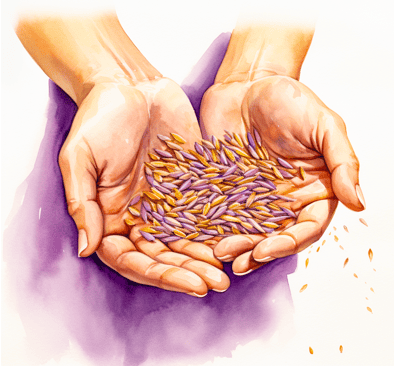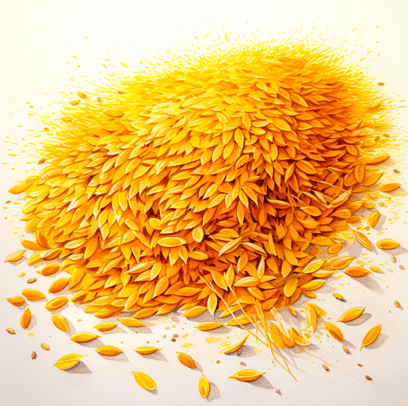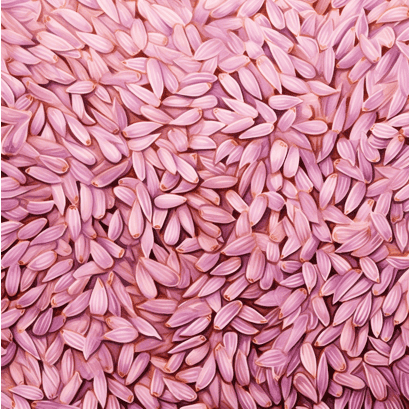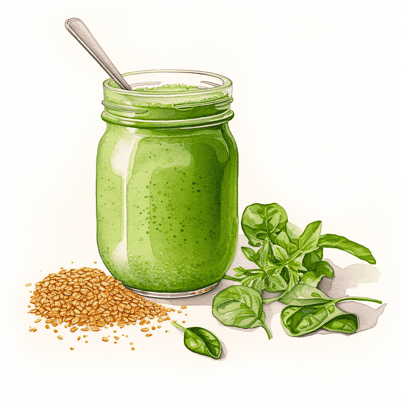
Do you want to know if golden flax seeds vs brown significantly impacts your nutrition and beauty outcomes?
Or does one taste better than the other? Let’s find out.
Hi, I’m Hazel
I gave up on skincare after years of issues with acne and sensitive skin.
But after going plant-based, my skin cleared up and even started to glow. Now I help women reveal their natural beauty with simple, delicious plant-based food.
I also used to be a nurse, and love nerding out on nutritional science (high-quality science, that is).

As usual, this post is based on the strongest nutritional evidence I could find with a focus on the simplest, most delicious foods
…because who has time to waste on actions that don’t work?
The quick version:
Golden and brown flax seeds both offer significant health benefits, including high levels of omega-3 fatty acids, dietary fibre, and lignans. Golden flax seeds are milder and less visually intrusive in recipes, while brown flax seeds have a robust flavor and might contain slightly higher antioxidant levels. Availability varies, with brown flax seeds more commonly found in grocery stores and golden flax seeds often requiring a visit to health food stores.
Which is More Palatable?
First, let’s see which kind tastes better, or is hidden in your food more easily.
Golden Flax Seeds: Subtly Enhancing

This is ideal for those who may be new to using flax seeds or prefer not to alter the appearance of their meals significantly.
The milder, buttery flavour of golden flax seeds makes them a versatile addition to many dishes without overpowering other tastes.
Their lighter colour can be easily disguised in lighter-coloured foods like smoothies, yogurts, and baked goods such as pancakes and muffins.
Brown Flax Seeds: Bold and Nutritious
In contrast, the nutty taste and darker colour of brown flax seeds can be more noticeable, making them a great fit for recipes where their rich flavour can be appreciated.
They blend well with whole grain dishes, such as breads and granola, and can be a flavourful addition to oatmeal and cookies.
Their stronger flavour and colour are less likely to go unnoticed, which could be beneficial for those looking to add a nutritional boost with a noticeable taste enhancement.
Why the Different Colours?
Golden Flax Seeds
Golden flax seeds owe their light, golden colour to the specific variety of the flax plant they come from.
These seeds are harvested from plants that are genetically selected to produce seeds with a lighter, golden hue.
Brown Flax Seeds

Brown flax seeds come from a more common variety of the flax plant that naturally produces seeds with a darker, rich brown colour.
This colouration is due to the higher concentration of certain pigments in the seed coat, which are linked to their robust, nutty taste and potentially higher fatty acid content.
Beauty Benefits

A Note on Flaxseed Research
While many studies explore the health benefits of flaxseeds, they often don’t specify between golden and brown varieties. Only one study I found compared the two and found no significant differences in health outcomes (1).
Therefore the insights below refer to the general nutritional benefits of all flaxseeds.
Fast-Track Healing
Supplementing with flaxseed-derived omega-3 fatty acids has been shown to significantly speed up wound healing (2).
This is crucial not just for recovery from injuries but also for everyday skin repairs from minor cuts to even acne.
Sensitive Skin Saviour
Regular intake of ground flaxseeds reduces skin sensitivity and redness (3).
This effect is enhanced by flaxseeds’ ability to improve skin hydration and texture, making your skin look smoother and healthier.
Weight Loss That Works
Adding ground flaxseeds to your diet can help you lose weight more effectively (4).
Despite their caloric content, flaxseeds increase satiety and improve metabolic health, making them a strategic choice for maintaining a healthy weight.
Antioxidant Power: Golden vs. Brown
Both golden and brown flax seeds are rich in antioxidants which play a critical role in skin health by protecting skin cells from oxidative stress caused by free radicals.
The darker colour of brown flax seeds might suggest they have a higher antioxidant content. Darker pigmented foods typically have more robust antioxidant properties due to a higher concentration of compounds like phenolics and flavonoids.
Although specific studies comparing the exact antioxidant content in golden vs. brown flax seeds are limited, this reasoning can guide us to hypothesise that brown flax seeds could offer slightly more potent antioxidant benefits.
If you’re looking for a potential edge in antioxidant power, brown flax seeds might be the way to go.
Nutritional Benefits
Fight Inflammation
Flaxseeds contain polyunsaturated fatty acids such as omega-6 fats, and oxylipins, which help reduce inflammation (5, 6). As a plant-based food they are also high in antioxidants which is important for beating off inflammation (7).
Combat Menopause and More
Flaxseeds are a natural way to ease menopause symptoms like hot flashes thanks to their phytoestrogen content (7). These nutritional powerhouses also help manage blood sugar levels and cancer prevention by reducing risks associated with breast cancer (8, 9).
Boost Heart Health and Digestion
The high levels of omega-3, particularly alpha-linolenic acid, in flaxseeds support heart health by improving blood pressure (8, 10). Their rich dietary fibre content benefits the digestive tract, aiding in weight loss and promoting a healthy weight.
Why Ground Flaxseeds are Best
Ground Flaxseed: Maximum Nutrient Absorption
Ground flaxseed is superior when it comes to nutrient absorption compared to whole flax seed.
The main difference lies in the body’s ability to access the nutritional content. Whole seeds often pass through the digestive system intact, meaning you don’t get as much benefit from their nutritional value.
In contrast, ground flaxseed breaks down more easily, allowing your body to absorb the rich B vitamins, fibre, and essential fatty acids.
Just Grind Them at Home
Using a coffee grinder or a NutriBullet to grind whole seeds into flax meal at home can be more cost-effective than buying pre-ground options or flax oil.
This method ensures you receive the full spectrum of nutritional content found in the seeds, making ground flax seed the best thing for both your health and your wallet.
Culinary Versatility
Ground flaxseed can be easily added to a variety of recipes without the texture issues that might come with whole seeds. It blends seamlessly into smoothies, batters, and doughs, enhancing meals with minimal impact on taste and texture.
Keep it Cool
To preserve the freshness and potency of ground flaxseed, it’s essential to store it in the fridge. This prevents the oils in the flaxseed from going rancid, ensuring that you retain the maximum health benefits each time you use it.
Are Golden Flaxseeds Worth the Effort?
Nutritional and Taste Benefits
While both golden and brown flax seeds offer substantial health benefits, the golden variety tends to have a milder, more buttery flavour that might be more appealing if you prefer a subtler taste in your meals.
Additionally, the lighter colour of golden flaxseeds can be less intrusive in certain recipes, making them ideal for blending into foods where you might want to maintain a specific colour or texture.

Antioxidant Considerations
Although the antioxidant content might be slightly lower in golden flaxseeds compared to their brown counterparts, they still provide a robust profile of health benefits, including omega-3 fatty acids, dietary fibre, and lignans.
The difference in antioxidant levels is generally small and should be weighed against the flavour and culinary flexibility that golden flaxseeds offer.
Availability and Cost
Golden flaxseed meal and cold milled flax are not as readily available in regular grocery stores and might require a trip to a health food store or an online purchase. So you should consider whether the ease of obtaining brown flaxseed outweighs the specific benefits of the golden variety.
If you enjoy experimenting with new ingredients and don’t mind the extra effort, seeking out golden flaxseeds could be a worthwhile endeavor.
Overall Recommendation
If taste and colour are significant factors for you, and you’re willing to put in a bit of extra effort to source them, golden flaxseeds can be a delightful addition to your pantry. However, if convenience and availability are your priorities, sticking with the more accessible brown flaxseeds will still ensure you reap plenty of nutritional benefits.
Golden Flax Seeds vs Brown: Making the Right Choice
We’ve explored the various aspects of golden flax seeds vs brown—from their distinct flavours and nutritional benefits to their beauty advantages and availability. Now that you understand the differences and benefits of each, you can make an informed choice that best suits your health and culinary preferences.
References
Most references below will link to the original peer-reviewed study itself. However, sometimes I will link to a video over at NutritionFacts.org instead, which is by far the single best resource of brutally transparent nutritional evidence you will ever see. Dr Greger tells a great story about the realities of the science and if I think you will benefit more from one of his videos, the link will take you there instead.
Happy nerding!
- Machado AM, de Paula H, Cardoso LD, Costa NM. Effects of brown and golden flaxseed on the lipid profile, glycemia, inflammatory biomarkers, blood pressure and body composition in overweight adolescents. Nutrition. 2015;31(1):90-96. doi:10.1016/j.nut.2014.05.002
- Soleimani Z, Hashemdokht F, Bahmani F, Taghizadeh M, Memarzadeh MR, Asemi Z. Clinical and metabolic response to flaxseed oil omega-3 fatty acids supplementation in patients with diabetic foot ulcer: A randomized, double-blind, placebo-controlled trial. J Diabetes Complications. 2017;31(9):1394-1400. doi:10.1016/j.jdiacomp.2017.06.010
- Neukam K, De Spirt S, Stahl W, et al. Supplementation of flaxseed oil diminishes skin sensitivity and improves skin barrier function and condition. Skin Pharmacol Physiol. 2011;24(2):67-74. doi:10.1159/000321442
- Yari Z, Rahimlou M, Eslamparast T, Ebrahimi-Daryani N, Poustchi H, Hekmatdoost A. Flaxseed supplementation in non-alcoholic fatty liver disease: a pilot randomized, open labeled, controlled study. Int J Food Sci Nutr. 2016;67(4):461-469. doi:10.3109/09637486.2016.1161011
- Rahimlou M, Jahromi NB, Hasanyani N, Ahmadi AR. Effects of Flaxseed Interventions on Circulating Inflammatory Biomarkers: A Systematic Review and Meta-Analysis of Randomized Controlled Trials. Adv Nutr. 2019;10(6):1108-1119. doi:10.1093/advances/nmz048
- Caligiuri SPB, Parikh M, Stamenkovic A, Pierce GN, Aukema HM. Dietary modulation of oxylipins in cardiovascular disease and aging. Am J Physiol Heart Circ Physiol. 2017;313(5):H903-H918. doi:10.1152/ajpheart.00201.2017
- Carlsen MH, Halvorsen BL, Holte K, et al. The total antioxidant content of more than 3100 foods, beverages, spices, herbs and supplements used worldwide. Nutr J. 2010;9:3. Published 2010 Jan 22. doi:10.1186/1475-2891-9-3
- Parikh M, Maddaford TG, Austria JA, Aliani M, Netticadan T, Pierce GN. Dietary Flaxseed as a Strategy for Improving Human Health. Nutrients. 2019;11(5):1171. Published 2019 May 25. doi:10.3390/nu11051171
- Calado A, Neves PM, Santos T, Ravasco P. The Effect of Flaxseed in Breast Cancer: A Literature Review. Front Nutr. 2018;5:4. Published 2018 Feb 7. doi:10.3389/fnut.2018.00004
- Khalesi S, Irwin C, Schubert M. Flaxseed consumption may reduce blood pressure: a systematic review and meta-analysis of controlled trials [published correction appears in J Nutr. 2015 Nov;145(11):2633. doi: 10.3945/jn.115.222232]. J Nutr. 2015;145(4):758-765. doi:10.3945/jn.114.205302